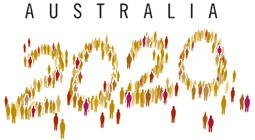 Perhaps I’m naive about what can really be achieved, but I felt the need to provide a submission to Kevin Rudd’s Australia 2020 Summit. Here’s what I wrote:
Perhaps I’m naive about what can really be achieved, but I felt the need to provide a submission to Kevin Rudd’s Australia 2020 Summit. Here’s what I wrote:
Over a quarter of a million Australian citizens work for the betterment of this country, but are denied the right to participate in our democracy.
According to the ATO, in 2004-05 there were 280,325 people under the age of 18 years who submitted tax returns. These people earn tax dollars for the government, and yet have no say in how it is spent.
In 1973, the voting age was lowered from 21 years to 18 years. It is time to lower it again, and directly connect our government to the youth of today and the future.
“No taxation without representation” was a political catch-cry in 18th century America, and was the philosophical basis for the American colony to reject the rule of their country from the disconnected British parliament. Here in Australia, we have a section of our population who still do not have that representation, over 200 years later.
Although around 4% of the Australian population is aged between 15 and 17 (according to the 2006 Census), many more than the entire state of Tasmania, they cannot influence the election of governments that directly impact their lives through:
- Funding of schools
- Educational curriculum
- Driving age restrictions
- Smoking/drinking age restrictions
- Youth wages and working restrictions
- Entertainment classifications
- Juvenile justice system
- in addition to laws, policies and taxation rules that apply equally to all Australians.
This is essentially a moral question: is it right for the voting population’s government to impose rules on productive, yet non-voting, Australians?
This is particularly relevant in the context of the Australia 2020 summit, where it is the younger Australians who are inheriting the consequences of the decisions made today. Decisions made by elected officials that they did not have a say in the election of.
It is true that the constituency of a democracy is only those who vote. We have given the vote to Aboriginals, and Australia led the way in giving the vote to women. How can it be just to with-hold the vote from other productive citizens?
In the last couple of decades, as trading hour restrictions have been loosened, and the cost of living has increased, youths in this country have increasingly taken up jobs in establishments such as supermarkets, fast-food outlets and service stations. This is clearly different to 1950s Australia, and requires different laws that recognise the importance of our younger citizens.
The specifics of the changes to the Commonwealth Electoral Act are for the political process to decide on. The specifics will include the precise age, whether voting should be voluntary, and whether it should be connected to the employment situation.
I trust that the above has made a compelling case that we are doing wrong by a significant fraction of our population, and that our democratic government is all the poorer for it. Fortunately, the solution is simple: lower the voting age.
“Taxation without representation is Tyranny” – James Otis (1725-1783)
![]()
![]()
![]()
![]()
![]()
